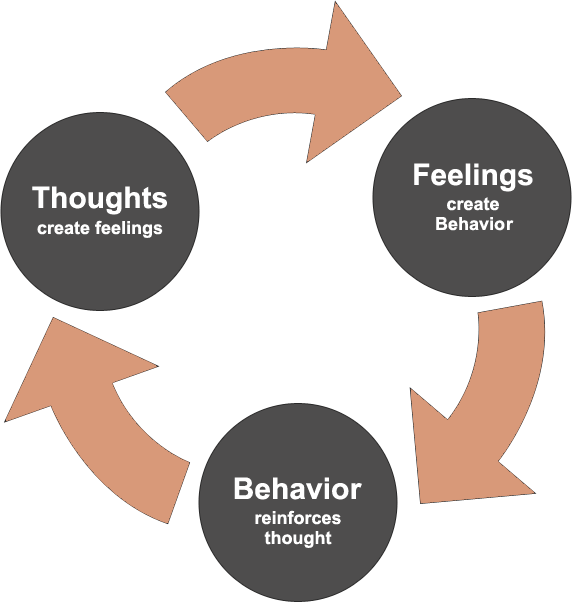(Cognitive Behavioral Therapy) CBT Therapy in Phoenix, AZ
CBT Therapy: A Practical Approach to Mental Health in Phoenix, AZ
CBT Therapy because the way you think might be more powerful than you know.
CBT Therapy is an approach that is most often used in the treatment of depression and anxiety. The basic premise is that your thoughts, emotions, and behaviors are inextricably related. However, based on this approach, emotions are challenging to change directly. This is why Cognitive Behavioral Therapy focuses on your thoughts and behaviors that amplify your distressing emotions.

CBT Therapy does NOT Equal Thinking Positively.
There are two worlds inside of you: the world you are aware of and the one (subconscious) you are unaware of. While you may try being in a state of permanent positivity, soon enough, you will realize that it does not work. In fact, toxic positivity can be a cognitive distortion. Indeed, who tries to be positive all the time? Someone who is deep down negative.
CBT Therapy is a Problem-Oriented Approach.
It may seem counterintuitive, but CBT will focus on the negative first to understand your original assumptions and help you reframe those beliefs that are inadequate to help you think in a way that lifts you up rather than tears you down. A CBT therapist will show you how to identify the way the situations in question influence your thoughts and behaviors; show you how to become aware of the connection between thoughts, behaviors, and emotions; and show you how to improve your emotional states by changing unhelpful thinking and behaviors that lead to negative emotional states such as anxiety and depression
.What is the main technique in CBT therapy?
CBT uses a combination of techniques that are focused on identifying specific issues, helping you become aware of harmful thought patterns, reshaping these patterns in a way that changes how you feel, and finally, learning and practicing new behaviors.
The Downward Arrow Technique in CBT.
The Downward arrow[*] is used to access your core beliefs to understand the nature of the symptoms better. Core beliefs comprise a set of implicit expectations, which you learned during your childhood either through your own experiences or, most often, from other people: parents, teachers, and peers. These core assumptions serve as the foundation for the entire belief system to be built upon, no matter how accurate or inaccurate these beliefs are. Some of these assumptions can lift you up; however, for most people, the majority of our core assumptions disempower us due to the way we are conditioned.
Based on CBT, the cycle starts with an original assumption, which acts as a filter that allows you to focus on the things which are congruent with that original belief. This focus, in its turn, will affect the way you feel and influence your micro-behaviors. These then create a self-fulfilling prophecy, which gives you the result (reference experience) that reinforces the belief.
Cognitive restructuring or reframing
In order to learn how to reframe in CBT Therapy, you first need to know what a frame is. Think of it as a house with a window frame. When you look outside, what you will see will depend on the location of that window, its size, the way it’s angled, and the color of the glass. This means that you don’t experience reality as it is; you experience it through a specific prism: the senses, the way you are conditioned, and the beliefs that you have taken on. As a result, generally, you will see things that are aligned with your frame, and the rest tends to be blocked off.
Cognitive reframing is a technique used to shift your mindset so you can look at a situation, person, or relationship from a different perspective[*] or a different “window.” You take anything thrown at you, and you repackage it in a way that is beneficial for you. This is something that you should master with a skilled therapist that practices CBT Therapy.
There are also other CBT techniques such as exposure therapy, journaling negative thoughts that may occur between sessions, activity scheduling, behavior activation and experimentation, relaxation, role play, and others that you may learn from your therapist.
What are the Limitations of CBT Therapy?
Since pure CBT Therapy is based on reframing negative or distorted cognitions, CBT does not set it as its goal to heal the underpinnings of such beliefs or choices. However, whether you focus on such beliefs or not, reframe them or not, they may stay active: like the things you deem unforgivable or the things you hate yourself for. These things tend to be stuffed down, and you may not realize they are there while they are active.
Instead of thinking of CBT Therapy as a universal solution, think of CBT Therapy as an effective stepping stone to addressing some of the issues you may have. However, in some circumstances, such as PTSD or complex trauma, CBT may not be entirely adequate.
As a simplification, think of CBT as giving a room in your home a makeover. It’s fantastic for updating the aesthetics with new colors and furniture, making the space more visually appealing and enjoyable. This is one of the puzzle pieces that shouldn’t be ignored, but it shouldn’t be the only aspect that is worked on either. Suppose the room has structural issues, such as a weak foundation or hidden structural water damage with an actively leaky pipe in the wall. In that case, a makeover won’t address these fundamental problems. When these issues are ignored, it’s not uncommon to feel disappointed when CBT doesn’t yield the expected results. This can lead to feelings of frustration, disappointment and even worsen issues like depression or low self-esteem. That’s why it’s essential to recognize that while CBT can be helpful in some aspects, it might not be a comprehensive solution for everyone’s mental health needs.
How to Complement CBT Therapy in Phoenix, AZ
CBT Therapy is an inherent part of a proper therapeutic process. As such, this modality should be employed in almost every other psychotherapy, at least to some extent. However, keep in mind that CBT Therapy is most effective when it is combined with other evidence-based approaches, such as EMDR Therapy or Accelerated Resolution Therapy, which help you get to and address the root causes of some of the most negative core cognitions that you may have. All of these psychotherapies are available to complement your transformation at no extra charge in my office in Phoenix or via online therapy in Arizona statewide.

